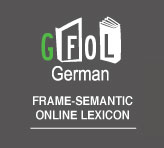Frame description
In this frame someone (the Experiencer) wants something to happen - namely, an Event. The Event is some kind of change that affects someone or something (the Affected). Generally, using lexical units in this frame implies that the Event has not actually happened yet, but that the Experiencer believes they would be happier or better off if it did.
Examples:
| 1. Er wünschte sich ein Handy zu Weihnachten. | 1. He wished (for himself) a cell phone for christmas. |
| 2. Peter hatte keine Lust ins Büro zu gehen. | 2. Peter had no desire to go to the office. |
| 3. Sie hatte eine große Sehnsucht nach ihren Eltern. | 3. She had a great longing for her parents. |
It is common in German and in English for verbs of desire to take the Affected as a direct object without overtly expressing the Event, as in the example 3 above. This is especially common when a form of possession is the implied Event:
| German | English |
| Ich will ein neues Auto. | I want a new car. |
| Sara möchte einen neuen Job. | Sara would like a new job. |
Both languages can also omit the verbal expression of the Event with eating and drinking. In contrast to English, however, German also commonly omits the Event verb with "going" ("gehen"). For example:
| German | English |
| Möchtest du ins Kino? | Would you like [to go] to the movies? |
| Stefan will nach Hause. | Stefan wants [to go] home. |
This is made possible by German's case system, where prepositions indicate movement in a way that is not possible in English. In the first example, "ins" indicates "going to" by combining "in" with the accusative "das" as the contraction "ins" ("to," "into").

